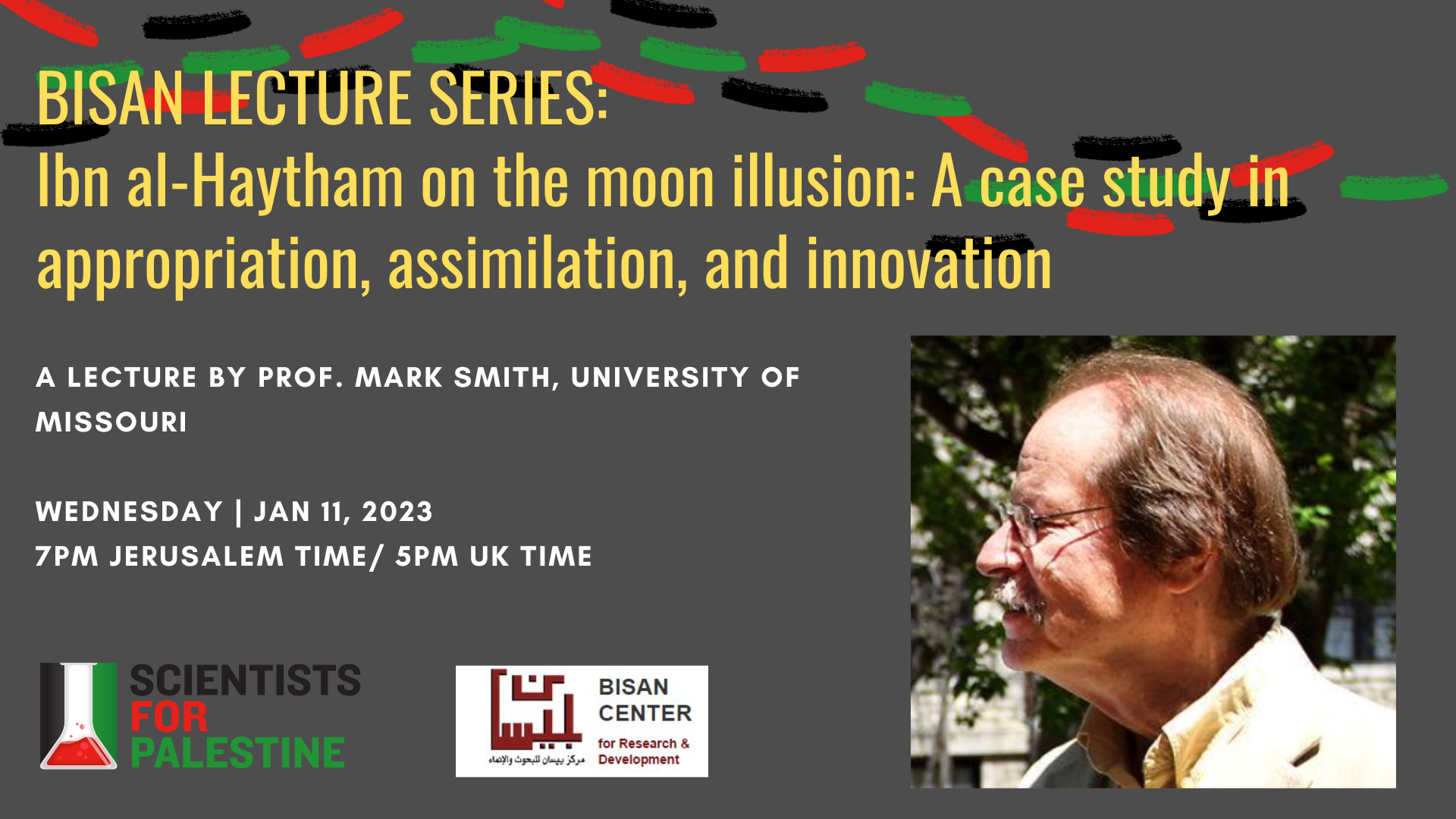The next Bisan Lecture webinar will take place on Wednesday, January 11th at 7pm Palestine time (6pm Central European Time, 12 noon US Estern time). We will have the pleasure to welcome Prof. Mark Smith (University of Missouri) who will speak on Ibn al-Haytham’s Analysis of the Moon Illusion: A Case Study in Appropriation, Assimilation, and Innovation. You can register for the event on Zoom here.

Dear Colleagues,
On December 14th, Professor Daniel Pauly (University of British Columbia) gave the last lecture of 2022 of the Bisan Lecture Series. He gave a country-by-country overview of the state of fisheries in the Southern Mediterranean. Catches are grossly underreported and a large part of the scientific work goes towards getting closer to the truth. The global picture is that of a sea being quickly depleted of its native fauna, starting from the larger predators (sharks, tuna) downwards, which is then replaced by species from the Red Sea, including some nasty specimens such as Lagocephalus Sceleratus. The consequences for the societies around the Southern Mediterranean, particularly for the poor, are quite dire. You can watch the video recording here. The lecture slides are available here. Further information on the fisheries of the Southern Mediterranean, or any other place, can be obtained from the Sea Around Us website (a research initiative of Prof. Pauly).
We are pleased to announce that the next Bisan Lecture webinar will take place on Wednesday, January 11th at 7pm Palestine time (6pm Central European Time, 12 noon US Estern time). We will have the pleasure to welcome Prof. Mark Smith (University of Missouri) who will speak on
You can register for the event on Zoom here.
Abstract: We tend to view “breakthrough” scientific thinkers as lone geniuses whose originality of thought is so total that it transcends the thinkers’ actual time and place. As a result, we often treat them as if they had no intellectual past. Ibn al-Haytham (965 CE?–1040 CE) offers an instructive example. Much that has been written about him at both the popular and scholarly level emphasizes the modernity of his ideas at the expense of their roots in the past. The result is a badly skewed account of both his thought and its historical development.
With that in mind, I’ll examine Ibn al-Haytham’s explanation of the Moon Illusion in the seventh book of his magisterial Kitāb al-Manāẓir (“Book of Optics”). In the process, I’ll look at 1) how he drew on Greek sources, Ptolemy’s Optics in particular, for his basic knowledge of optical precepts (appropriation), 2) how he adapted that knowledge to make it his own (assimilation), and how, on that basis, he expanded the scope of optical analysis in an original way (innovation).
Biographical Sketch: Mark Smith
Curators’ Professor of History (emeritus), at the University of Missouri, Columbia, A. Mark Smith has published widely on ancient, medieval, and early modern optics and visual theory. Foremost among these publications is his eight-volume critical edition and translation of Alhacen’s De aspectibus, the medieval Latin version of Ibn al-Haytham’s Kitāb al-Manāẓir,which has appeared in installments between 2001 and 2010. More recently, he has published From Sight to Light: The Passage from Ancient to Modern Optics (University of Chicago, 2015) and Optical Magic in the Late Renaissance: Giambattista Della Porta’s De Refractione of 1593 (American Philosophical Society, 2019).
This lecture is sponsored by the Bisan Center for Research and Development, Scientists for Palestine and the Center for Palestinian Studies of Columbia University
On this holidays season, the BLS Steering committee invites the webinar participants to consider donating to our Palestinian partner, the Bisan Center for Research and Development, which is one of the six prominent Palestinian civil society organizations designated by the Israeli Defense Minister “terrorist organizations” on October 19, 2021. This baseless defamatory accusation targets organizations recognized for their professionalism and competence in the field of human rights through research, exchanges, advocacy and training activities. Their work is frequently cited by United Nations experts and major international NGOs.
In the early morning hours of August 18, 2022, Israeli occupation forces forced their way in, attacked and ransacked the offices of the six NGOs, confiscating and damaging their property.
Due to the baseless defamatory “terrorist” designation and the raid on its offices, the Bisan Center for Research and Development has been suffering financially. Your support can make the difference. Consider donating here.
Hoping to see many of you at the next webinar, we send our best wishes for the holiday season,
The Bisan Lecture Series Steering Committee
Next BLS webinar
– Wednesday February 8, 2023, 7 pm Palestine time
Prof. Juliet Floyd (Boston University)
Title: Revisiting the Turing Test
– Wednesday March 8, 2023, 7 pm Palestine time
Marina Warner (Mythographer, novelist and independent scholar)
– Wednesday April 12, 2023, 7 pm Palestine time
TBA
– Wednesday May 10, 2023, 7 pm Palestine time
TBA
To receive BLS announcements, you can subscribe to the mailing list here.
BLS Statement of purpose
In concert with Scientists for Palestine and the Bisan Center for Research and Development, and in keeping with their joint commitment to full integration of Palestine in the global community of learning, the Bisan Lecture Series sponsors discourses on subjects of cultural, scientific, and societal importance by leading research experts and public intellectuals of varied heritage and viewpoint. The interactive webinars are free and open to the public, and recordings of each will be posted soon afterward.
